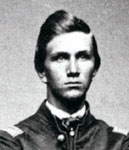 Open main menu
Open main menu
 Open main menu
Open main menu

C.A. Clark
(1841 - 1913)
Home State: Maine
Command Billet: Regimental Adjustant
Branch of Service: Infantry
Unit: 6th Maine Infantry
Before Antietam
He enlisted as Private in Company A in April 1861, and was promoted to Corporal and Quartermaster Sergeant in July. He was made 2nd Lieutenant on 5 February, and 1st Lt and Regimental Adjutant on 10 August 1862.
The rest of the War
He received the Medal of Honor for his actions at Banks Ford, Virginia, just outside of Fredericksburg, 4 May 1863. He was severely wounded in a charge on the Rappahannock in November 1863, but was appointed Captain and AAG 18 May 1864 and returned for action around Petersburg by July 1864. He resigned 11 November 1864 and returned to his home in Maine. He was later cited by brevets (to Major and Lt Colonel) for his heroism at Marye's Heights and Rappahannock Station (VA)
After the War
He studied law, and, in May, 1866, moved to and practiced in Webster City, Hamilton County, Iowa. In 1876 he moved to Cedar Rapids. By 1880 he had argued before the US Supreme Court. He served one term as mayor of Cedar Rapids.
References & notes
Source: Biographical Record of Linn County, Iowa,
Chicago: The S. J. Clarke Publishing Company, 1901 extracted online by the Iowa Biographies Project on RootsWeb; and
Heitman, Francis Historical Register and Dictionary of the United States Army 1789-1903, Washington, US Government Printing Office, 1903.
The photograph above is from contributor Gregory Speciale for Clark's gravesite page on Find-a-grave.
Birth
1/26/1841; Sangerville, ME
Death
12/22/1913; burial in Oak Hill Cemetery, Cedar Rapids, IA